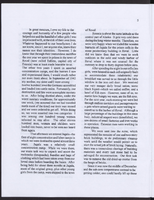Search the Special Collections and Archives Portal
Search Results
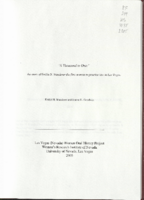
Transcript of interview with Emilie Wanderer by Joanne Goodwin, 2000
Date
Archival Collection
Description
Emilie Wanderer was the first woman to establish a law practice in Las Vegas. She also helped to start a family court in Nevada with a social worker and a marriage counselor on staff. She and her son John were the first mother-son team to practice law in Nevada.
Text

Transcript of interview with Margo Mink Colbert by Barbara Tabach, November 11, 2014
Date
Archival Collection
Description
Interview with Margo Mink Colbert by Barbara Tabach on November 11, 2014. Colbert discusses her upbringing in New York and her schooling at the High School of Performing Arts and Julliard. She is a choreographer and faculty member at the University of Nevada Las Vegas.
Margot Mink Colbert was born in 1935 in New York City, to parents of different economic backgrounds who shared a Jewish immigrant heritage. She attended Julliard and studied under modern dance pioneers like Martha Graham and Jose Limon. Margot honed her skill for choreography, and took her first job in academia as a Senior Lecturer in the dance department at the University of Wisconsin-Madison. In 1991, she moved to the University of Nevada, Las Vegas to take a one-year appointment as an instructor. A year later, she was hired into a tenure track position. Margot is now a Professor at the University of Nevada-Las Vegas, assistant chairperson of and Director of Ballet in its Department of Dance. In addition, she continues to direct Ballet Mink, a dance company she founded in 1970.
Text
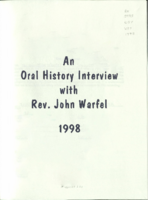
Transcript of interview with John Warfel by Dennis McBride, March 11, 1988
Date
Archival Collection
Description
This is Dennis McBride, today is Wednesday, March 11,1998 and I'm talking with John Warfel at Christ Church Episcopal who 's going to be leaving Las Vegas permanently March 16, so I'm very grateful that he made some time for me today. We're going to be talking about Christ Church, about Dignity and their experience here, and about Mr. Warfel himself.
Text

Interview with Paul Colbert, July 12, 2004
Date
Archival Collection
Description
Text

Interview with Peter Ediger, June 24, 2005
Date
Archival Collection
Description
Text
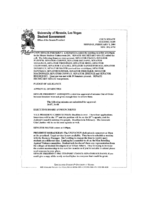
Meeting minutes for Consolidated Student Senate, University of Nevada, Las Vegas, February 09, 2004
Date
Archival Collection
Description
Text
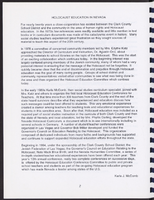
Holocaust Education Conference program, 1997
Date
Archival Collection
Description
Booklet program from the Holocaust Education Conference, 1997.
Text

Interview with Native American Forum on Nuclear Issues, April 10, 2008
Date
Archival Collection
Description
Text
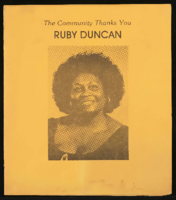
Las Vegas Westside: newspaper clippings, community programs, and correspondence
Date
Archival Collection
Description
Folder of materials from the Mabel Hoggard Papers (MS-00565) -- Civic engagement file. Las Vegas Westside newspaper clippings, community programs, and correspondence. This folder includes a program for a tribute to Ruby Duncan; Operation Life Community Press newsletter, Year 1, Volume 4, March 1978; Westside Council summary; Westside Federal Credit Union Education Committee records; and Nevada Equal Rights Commission letters and amended statistical report, March 16, 1978.
Mixed Content

